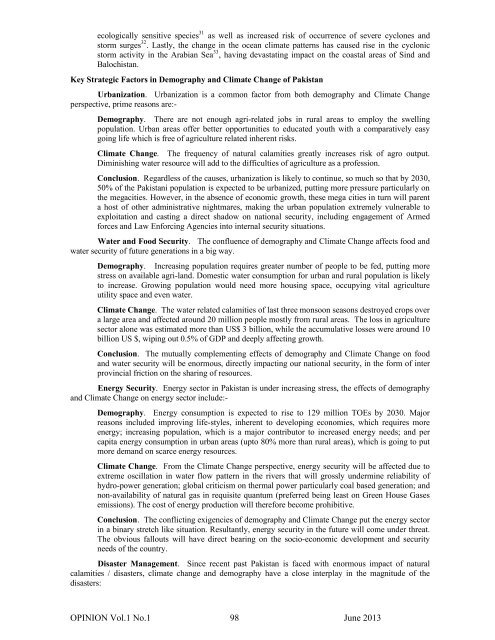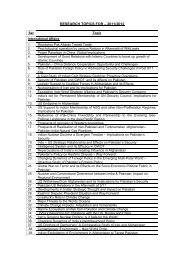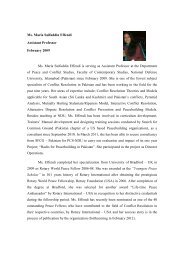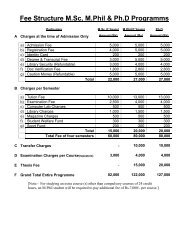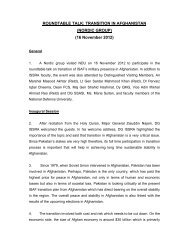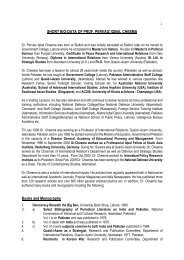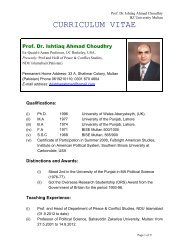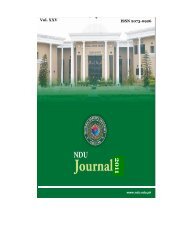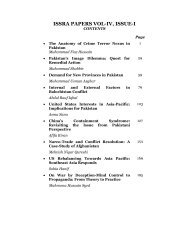OPINION Vol.1, No.1 June 2013 - National Defence University
OPINION Vol.1, No.1 June 2013 - National Defence University
OPINION Vol.1, No.1 June 2013 - National Defence University
You also want an ePaper? Increase the reach of your titles
YUMPU automatically turns print PDFs into web optimized ePapers that Google loves.
ecologically sensitive species 31 as well as increased risk of occurrence of severe cyclones and<br />
storm surges 32 . Lastly, the change in the ocean climate patterns has caused rise in the cyclonic<br />
storm activity in the Arabian Sea 33 , having devastating impact on the coastal areas of Sind and<br />
Balochistan.<br />
Key Strategic Factors in Demography and Climate Change of Pakistan<br />
Urbanization. Urbanization is a common factor from both demography and Climate Change<br />
perspective, prime reasons are:-<br />
Demography. There are not enough agri-related jobs in rural areas to employ the swelling<br />
population. Urban areas offer better opportunities to educated youth with a comparatively easy<br />
going life which is free of agriculture related inherent risks.<br />
Climate Change. The frequency of natural calamities greatly increases risk of agro output.<br />
Diminishing water resource will add to the difficulties of agriculture as a profession.<br />
Conclusion. Regardless of the causes, urbanization is likely to continue, so much so that by 2030,<br />
50% of the Pakistani population is expected to be urbanized, putting more pressure particularly on<br />
the megacities. However, in the absence of economic growth, these mega cities in turn will parent<br />
a host of other administrative nightmares, making the urban population extremely vulnerable to<br />
exploitation and casting a direct shadow on national security, including engagement of Armed<br />
forces and Law Enforcing Agencies into internal security situations.<br />
Water and Food Security. The confluence of demography and Climate Change affects food and<br />
water security of future generations in a big way.<br />
Demography. Increasing population requires greater number of people to be fed, putting more<br />
stress on available agri-land. Domestic water consumption for urban and rural population is likely<br />
to increase. Growing population would need more housing space, occupying vital agriculture<br />
utility space and even water.<br />
Climate Change. The water related calamities of last three monsoon seasons destroyed crops over<br />
a large area and affected around 20 million people mostly from rural areas. The loss in agriculture<br />
sector alone was estimated more than US$ 3 billion, while the accumulative losses were around 10<br />
billion US $, wiping out 0.5% of GDP and deeply affecting growth.<br />
Conclusion. The mutually complementing effects of demography and Climate Change on food<br />
and water security will be enormous, directly impacting our national security, in the form of inter<br />
provincial friction on the sharing of resources.<br />
Energy Security. Energy sector in Pakistan is under increasing stress, the effects of demography<br />
and Climate Change on energy sector include:-<br />
Demography. Energy consumption is expected to rise to 129 million TOEs by 2030. Major<br />
reasons included improving life-styles, inherent to developing economies, which requires more<br />
energy; increasing population, which is a major contributor to increased energy needs; and per<br />
capita energy consumption in urban areas (upto 80% more than rural areas), which is going to put<br />
more demand on scarce energy resources.<br />
Climate Change. From the Climate Change perspective, energy security will be affected due to<br />
extreme oscillation in water flow pattern in the rivers that will grossly undermine reliability of<br />
hydro-power generation; global criticism on thermal power particularly coal based generation; and<br />
non-availability of natural gas in requisite quantum (preferred being least on Green House Gases<br />
emissions). The cost of energy production will therefore become prohibitive.<br />
Conclusion. The conflicting exigencies of demography and Climate Change put the energy sector<br />
in a binary stretch like situation. Resultantly, energy security in the future will come under threat.<br />
The obvious fallouts will have direct bearing on the socio-economic development and security<br />
needs of the country.<br />
Disaster Management. Since recent past Pakistan is faced with enormous impact of natural<br />
calamities / disasters, climate change and demography have a close interplay in the magnitude of the<br />
disasters:<br />
<strong>OPINION</strong> <strong>Vol.1</strong> <strong>No.1</strong> 98 <strong>June</strong> <strong>2013</strong>


